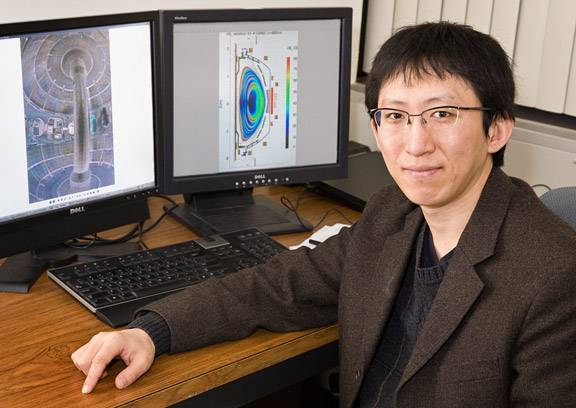As part of the American Recovery and Reinvestment Act (ARRA), Princeton University has received $27 million in research funding from the Air Force Office of Scientific Research, the U.S. Department of Energy, the National Institutes of Health and the National Science Foundation.
The Recovery Act grants will fund more than 60 projects in wide-ranging fields, including energy, mathematics, engineering, meteorology, computer science, politics and neuroscience. These awards include grants received by two scientists as part of the Department of Energy's new Early Career Research Program. Additional awards will be announced over the next several months.
In addition to these funds, the U.S. Department of Energy's Princeton Plasma Physics Laboratory (PPPL), which is managed by the University, has received a total of $19.4 million in ARRA funding. This includes $1.8 million in Recovery Act funding to support innovative experimental approaches to fusion and develop specialized instrumentation to enable highly precise measurements during fusion experiments, as well as $13.8 million in support of fusion energy research and infrastructure improvements. Additionally, a PPPL physicist has been awarded a $2.5 million award through the new DOE Early Career Research Program.
"Princeton is honored to receive these stimulus funds, which recognize the potential for extraordinary economic and societal impact in the work being done by our world-class research community," said A.J. Stewart Smith, Princeton's dean for research and the Class of 1909 Professor of Physics. "Whether advancing the understanding of mathematics, developing cleaner-burning jet fuels, or gaining deeper insight into the workings of the human brain, the knowledge generated in the work supported by the American Recovery and Reinvestment Act will address a wide range of national goals and contribute to solving many of the greatest global challenges of the 21st century."

Jong-Kyu Park, a staff research physicist at the Princeton Plasma Physics Laboratory, has been awarded $2.5 million over five years as part of the Department of Energy's new Early Career Research Program. It will further his work in creating a numerical tool to calculate the effects of applying small amplitude, three-dimensional magnetic fields to fusion devices called tokamaks. These magnetic fields can significantly improve the ability of tokamak vessels to contain fusion reactions. Park received his Ph.D. in plasma physics from Princeton in 2009 and immediately joined the PPPL staff. He is shown here with images of the PPPL's National Spherical Torus Experiment. (Photo: Elle Starkman)
Examples include:
• a molecular biologist who will use the award to characterize the genetic basis of antibiotic resistance in E. coli bacteria. This increased understanding could provide guidance for the development of new drugs and therapeutic regimes.
• a chemist who is putting the grant toward the development of a novel solution to the complex and interrelated problems of greenhouse gas emissions and dwindling energy resources by using light to convert carbon dioxide into methanol and isopropanol — alcohols that can be used as fuel.
• a computer scientist who is working to improve Web access in disadvantaged regions through the development of "content retrieval networks."
• an engineer who will delve deeper into a breakthrough nanolithography technology developed in his lab to create ultrasmall features on microchips. The research has implications for many areas of science, including physics, biology, energy and consumer product development.
"America's economic prosperity, entrepreneurial spirit and openness to innovation are constantly nourished by scientific research," said U.S. Rep. Rush Holt. "The $27 million in federal stimulus funding received by Princeton University will have an immediate and long-term impact on the economy in central New Jersey. In December 2008, I arranged a roundtable discussion at Princeton with President [Shirley M.] Tilghman, Speaker of the House Nancy Pelosi, Congressional leaders, and national leaders in the science and technology community. The seeds planted there resulted in more than $22 billion in Recovery Act funding for science facilities and research and development."
Princeton's Office of the Dean for Research has provided brief summaries of the stimulus-funded work that will take place at Princeton on a website. Additional information on the ARRA is available from the Office of Research and Project Administration.